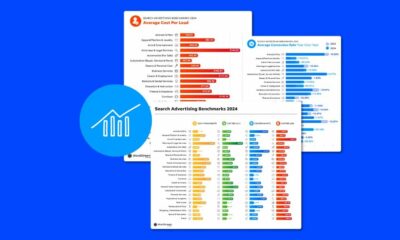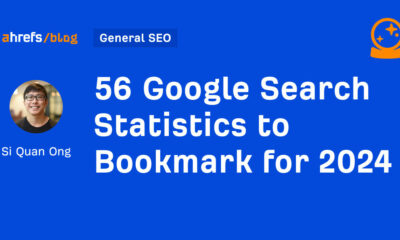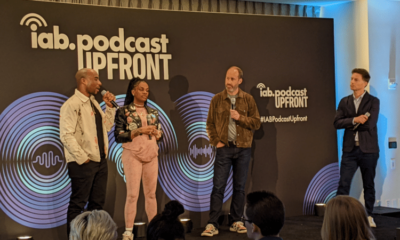The new app is called watchGPT and as I tipped off already, it gives you access to ChatGPT from your Apple Watch. Now the $10,000 question (or more accurately the $3.99 question, as that is the one-time cost of the app) is why having ChatGPT on your wrist is remotely necessary, so let’s dive into what exactly the app can do.
NEWS
Outbound Links to Authority Sites Good For SEO?

Google’s John Mueller offered his feedback on the SEO practice of linking out to authoritative websites. John Mueller explained the background of this SEO tactic and offered Google’s point of view about it, saying that it doesn’t really change anything.
Outbound Links to Authority Sites for SEO
There is an SEO practice dictating that that linking out to an authoritative website will help a site rank better.
This tactic doesn’t have any basis in anything a Googler said or published to indicate that linking to an authoritative site is a ranking factor or helps SEO.
It’s actually a practice that evolved from a 1998 algorithm research paper and from the seminal document of SEO practices created by one of the fathers of modern SEO, Brett Tabke.
HITS Algorithm
In 1998 Jon Kleinberg published a paper detailing his ranking algorithm research paper that used a new form of link analysis called, HITS.
This new process assigned a web page two scores:
- A hub score
- An authority score
Kleinberg based his HITS algorithm on the idea that some sites featured hand-curated pages that linked to authoritative sites. These sites that linked out to quality sites are called “hubs” and they were assigned a hub score.
The second idea behind HITS is that high quality sites accumulated links from hub pages. These pages are called, authorities. Authoritative sites were assigned an authority score.
This idea of a hub score and an authority score caught the attention of the SEO community which subsequently adopted the concepts of authority and hub scores as SEO best practices.
But here’s an important fact that has largely gone unconsidered: Google never used the HITS algorithm.
But the concept of hubs and authority sites nevertheless became integrated into the practice of SEO on the premise that maybe Google probably did use it or will use them in the algorithm.
Successful Site in 12 Months with Google Alone
In 2002 Brett Tabke (@btabke) published an article whose recommendations became the foundation of modern SEO.
This nearly 20 year old article was called:
The idea that it’s good to link to another site is one of the SEO best practices that Brett Tabke recommended in 2002.
Brett wrote:
“G) Outbound Links:
From every page, link to one or two high ranking sites under that particular keyword. Use your keyword in the link text (this is ultra important for the future).The reason I call Brett Tabke a father of modern SEO is because almost all the recommendations in that 2002 article became the standard for how to practice SEO.”
Many of the SEO practices from 2002, like linking out to an authoritative site, still continue to be regarded as useful by the SEO community, even though there has never been confirmation from Google that linking to an authoritative site is good for SEO.
Are Links to Authoritative Sites Good for SEO?
Here we are are 19 years later and linking out to authoritative sites is still a thing.
The person asking the question wanted to know if outbound links are still a thing.
Here is the question:
“Does giving a “do follow” link to a trusted authoritative site, is that good for SEO?”
John Mueller answered by first giving some background information about the practice of linking out.
I have a longer history in the search community than John Mueller, so my account of how this practice started is based on actually being there “way in the beginning.”
Nevertheless, Mueller’s version is pretty much on target.
Outbound Links for SEO Doesn’t Make Any Sense
John Mueller answered:
“I think this is something that people used to do, way in the beginning, where they would create a spammy website and on the bottom they’d have a link to Wikipedia and CNN and then hope that search engines look at that and say like, Oh, this must be a legitimate website.
But… like I said… people did it this way in the beginning and it was a really traditional spam technique, almost.
And I don’t know if this ever actually worked.
So from that point of view I would say no, this doesn’t make any sense.”
Linking Out Can Be a Good Practice
John Mueller next reaffirmed the usefulness of outbound links as a good practice in the case where the content references some other web page.
Mueller observed:
“Obviously, if you have good content within your website and part of that references existing other content then kind of that whole structure that makes a little bit more sense and means that your website overall is a good thing.
But just having a link to some authoritative page, that doesn’t change anything from our point of view.”
Outbound Links Don’t Change Anything for Google
John Mueller is clear that from an algorithmic point of view, outbound links don’t do anything for Google.
Every person who insists that it’s a good SEO practice to link out to an authoritative site who I asked for a citation cannot say why it’s a good practice.
Every person I’ve asked has struggled to find an statement from Google or a patent or a research paper that definitively nails that this is something that is good for SEO.
The reason they struggle is because there is no confirmation from Google that this is something that is good for SEO.
John Mueller’s statement is proof that there is no basis to the idea that linking to “authority sites” is good for SEO.
It’s a good user experience practice, though.
Watch John Mueller answer the question at the 31:25 minute mark:
Facebook Faces Yet Another Outage: Platform Encounters Technical Issues Again

Uppdated: It seems that today’s issues with Facebook haven’t affected as many users as the last time. A smaller group of people appears to be impacted this time around, which is a relief compared to the larger incident before. Nevertheless, it’s still frustrating for those affected, and hopefully, the issues will be resolved soon by the Facebook team.
Facebook had another problem today (March 20, 2024). According to Downdetector, a website that shows when other websites are not working, many people had trouble using Facebook.
This isn’t the first time Facebook has had issues. Just a little while ago, there was another problem that stopped people from using the site. Today, when people tried to use Facebook, it didn’t work like it should. People couldn’t see their friends’ posts, and sometimes the website wouldn’t even load.
Downdetector, which watches out for problems on websites, showed that lots of people were having trouble with Facebook. People from all over the world said they couldn’t use the site, and they were not happy about it.
When websites like Facebook have problems, it affects a lot of people. It’s not just about not being able to see posts or chat with friends. It can also impact businesses that use Facebook to reach customers.
Since Facebook owns Messenger and Instagram, the problems with Facebook also meant that people had trouble using these apps. It made the situation even more frustrating for many users, who rely on these apps to stay connected with others.
During this recent problem, one thing is obvious: the internet is always changing, and even big websites like Facebook can have problems. While people wait for Facebook to fix the issue, it shows us how easily things online can go wrong. It’s a good reminder that we should have backup plans for staying connected online, just in case something like this happens again.
NEWS
We asked ChatGPT what will be Google (GOOG) stock price for 2030

Investors who have invested in Alphabet Inc. (NASDAQ: GOOG) stock have reaped significant benefits from the company’s robust financial performance over the last five years. Google’s dominance in the online advertising market has been a key driver of the company’s consistent revenue growth and impressive profit margins.
In addition, Google has expanded its operations into related fields such as cloud computing and artificial intelligence. These areas show great promise as future growth drivers, making them increasingly attractive to investors. Notably, Alphabet’s stock price has been rising due to investor interest in the company’s recent initiatives in the fast-developing field of artificial intelligence (AI), adding generative AI features to Gmail and Google Docs.
However, when it comes to predicting the future pricing of a corporation like Google, there are many factors to consider. With this in mind, Finbold turned to the artificial intelligence tool ChatGPT to suggest a likely pricing range for GOOG stock by 2030. Although the tool was unable to give a definitive price range, it did note the following:
“Over the long term, Google has a track record of strong financial performance and has shown an ability to adapt to changing market conditions. As such, it’s reasonable to expect that Google’s stock price may continue to appreciate over time.”
GOOG stock price prediction
While attempting to estimate the price range of future transactions, it is essential to consider a variety of measures in addition to the AI chat tool, which includes deep learning algorithms and stock market experts.
Finbold collected forecasts provided by CoinPriceForecast, a finance prediction tool that utilizes machine self-learning technology, to anticipate Google stock price by the end of 2030 to compare with ChatGPT’s projection.
According to the most recent long-term estimate, which Finbold obtained on March 20, the price of Google will rise beyond $200 in 2030 and touch $247 by the end of the year, which would indicate a 141% gain from today to the end of the year.
Google has been assigned a recommendation of ‘strong buy’ by the majority of analysts working on Wall Street for a more near-term time frame. Significantly, 36 analysts of the 48 have recommended a “strong buy,” while seven people have advocated a “buy.” The remaining five analysts had given a ‘hold’ rating.

The average price projection for Alphabet stock over the last three months has been $125.32; this objective represents a 22.31% upside from its current price. It’s interesting to note that the maximum price forecast for the next year is $160, representing a gain of 56.16% from the stock’s current price of $102.46.
While the outlook for Google stock may be positive, it’s important to keep in mind that some potential challenges and risks could impact its performance, including competition from ChatGPT itself, which could affect Google’s price.
Disclaimer: The content on this site should not be considered investment advice. Investing is speculative. When investing, your capital is at risk.
NEWS
This Apple Watch app brings ChatGPT to your wrist — here’s why you want it

ChatGPT feels like it is everywhere at the moment; the AI-powered tool is rapidly starting to feel like internet connected home devices where you are left wondering if your flower pot really needed Bluetooth. However, after hearing about a new Apple Watch app that brings ChatGPT to your favorite wrist computer, I’m actually convinced this one is worth checking out.
-

 PPC5 days ago
PPC5 days agoHow the TikTok Algorithm Works in 2024 (+9 Ways to Go Viral)
-

 SEO6 days ago
SEO6 days agoBlog Post Checklist: Check All Prior to Hitting “Publish”
-

 SEO4 days ago
SEO4 days agoHow to Use Keywords for SEO: The Complete Beginner’s Guide
-

 MARKETING5 days ago
MARKETING5 days agoHow To Protect Your People and Brand
-

 PPC7 days ago
PPC7 days agoHow to Craft Compelling Google Ads for eCommerce
-

 SEARCHENGINES6 days ago
SEARCHENGINES6 days agoGoogle Started Enforcing The Site Reputation Abuse Policy
-

 MARKETING6 days ago
MARKETING6 days agoElevating Women in SEO for a More Inclusive Industry
-

 PPC6 days ago
PPC6 days agoHow to Brainstorm Business Ideas: 9 Fool-Proof Approaches
















You must be logged in to post a comment Login